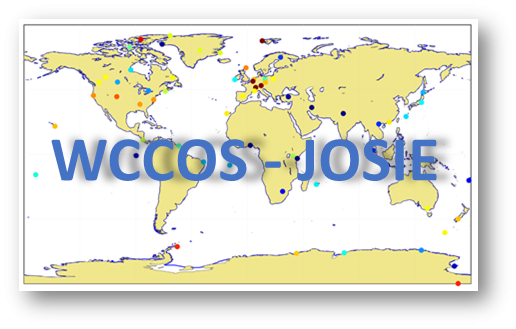JOSIE

JOSIE (Jülich Ozone Sonde Intercomparison Experiment) is a WMO (= World Meteorological Organization) activity towards implementing a global quality assurance plan for ozone sondes in routine use today around the world to watch global changes of ozone in the troposphere and stratosphere. In order to assess the performance of the different types of ozone sondes the environmental simulation chamber at the Forschungszentrum Jülich (Germany) is established as World Calibration Center for Ozone Sondes (WCCOS). The simulation chamber enables control of pressure, temperature and ozone concentration and can simulate flight conditions of ozone soundings up to an altitude of 35 km., whereby an accurate UV-photometer serves as a reference. Beginning 25 years ago in 1996, a series of JOSIE campaigns has since been conducted at the WCCOS to evaluate different ozonesonde types [Smit et al., J. Geophys. Res., 2007]. Table of WCCOS-JOSIE activities.
JOSIE has clearly demonstrated that even small differences in sensing technique, instrument type or operating procedures can introduce significant inhomogeneities in longterm sounding records among different stations or within individual time series. JOSIE results, along with a community consensus through ASOPOS (Assessment of Standard Operating Procedures for Ozone-Sondes), have provided SOP’s that have improved the quality of the global network and reduced overall uncertainty to ~10% [GAW-Report No. 201, 2014; https://library.wmo.int/doc_num.php?explnum_id=7167)].
With the Ozone Sonde Data Quality Assessment (O3S-DQA) process, known inhomogeneities in ozone time-series have been reduced further through the use of generic transfer functions, yielding uncertainties of 5-10% [Tarasick et al., AMT, 2016; Van Malderen et al., Atm. Met. Techn., 2016; Witte et al., J. Geophys.Res., 2017, 2018, 2019; Thompson et al., J. Geophys.Res., 2017; Sterling et al., Atm. Met. Techn., 2018]. However, evaluation of homogenized results has shown that to achieve an uncertainty better than 5%, further standardization of ground equipment and sonde operating procedures may be necessary. A recent JOSIE 2017-SHADOZ campaign at WCCOS [Thompson et al., Bull. Amer. Met. Soc., 2019] provided more tests aimed to support an “ASOPOS 2.0” initiative.




